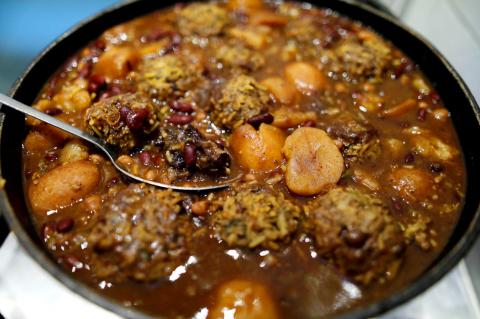Moshe Genzler lifts the lid off a huge aluminium pot, thrusts in a massive spoon and dishes out a steaming portion of beans, potatoes and beef.
It is a Thursday evening at Maadaniat Chef, a small restaurant in the central Israeli ultra-Orthodox city of Bnei Brak specializing in traditional eastern European Jewish food. The gefilte fish and potato kugel pale next to the warm brown glow of the eatery’s crowning glory — hamin — also known as cholent. Consumed by Jews for Saturday lunch since antiquity, the rich stew is enjoying a renaissance in Israel.
While ultra-Orthodox local residents sit at the few tables enjoying their steaming fare, three elderly women and a man, all secular, enter to enquire about the food.

Photo: AFP
The four are from the nearby cities of Givatayim and Ramat Gan and hope to celebrate a birthday with food from their childhood.
“We wanted to try something different,” says one of the women.
A bus drops off a group of senior citizens from Kfar Daniel, a village between Jerusalem and Tel Aviv, with their guide Yair Landsberg.

Photo: AFP
“A dish you ate in your childhood is memories,” he says. “It’s enough that you smell it and you’re full of memories, of nostalgia.”
Genzler — the young son-in-law of the restaurant’s owners — says eating hamin before the Sabbath has become trendy.
“You have people from all walks of life — ultra-Orthodox, secular, all kinds of religious people,” he says. “Groups arrive here as part of a tour of Bnei Brak and enter to see and feel an authentic Jewish experience.”
Hamin, meaning “hot things” in Hebrew, can be traced back to the Mishna, the early oral interpretation of the Torah, as part of the discussion on how food might be kept warm on the Sabbath. Jewish religious law prohibits cooking on Saturday, “but you can prepare something that will begin cooking before the Sabbath and continue to cook or retain its heat during the Sabbath,” notes Shmil Holand, a chef and expert on Jewish culture and food.
“That’s what created this dish.”
The Jews expelled from the land of Israel some 2,000 years ago were split into two parallel routes, one via Babylon to North Africa, Spain, the Balkans and what became the Muslim world.
The other group went to Rome, France and eventually central and eastern Europe. Holand says that over time, each Jewish diaspora created its own variation of the dish, based on the climate and available ingredients.
“Together something new came into being,” he says from the spacious kitchen of his Jerusalem home.
European Jews, who were eventually called Ashkenazim, referred to their hamin as cholent, derived from the French words for hot (chaud) and slow (lent).
And while other people around the world make variations of the dish, hamin stands out for the unusual length of its preparation — normally at least 12 hours, Holand says.
The dish has become a popular winter delicacy in Israel, enjoyed even by people who do not necessarily observe religious law.
‘TASTE OF CHILDHOOD’
A short drive from the Bnei Brak restaurant is Ramat Hahayal, an upscale Tel Aviv neighbourhood favoured by the country’s burgeoning technology sector.
Shuk Hatzafon, a local food court, held a “hamin festival” last month, with variations of the dish from Jewish communities in Austria, Iraq, Italy, India and elsewhere.
The hot spices of the Libyan hamin were balanced out with chard, sold next to a Moroccan version of the dish with groats, chickpeas, potatoes and meat.
Shimon, a young man from Tel Aviv, said hamin “gives you a feeling of home, regardless of your origin.”
Back in Bnei Brak, the religious significance of the dish is still its most important aspect for Genzler.
“Hamin is something that represents the Sabbath for a Jew,” he says.
“It’s been like this for thousands of years and will always remain Jewish food,” he insists.
Bruce Lax, a technician from Ramat Gan who grew up in an ultra-Orthodox neighbourhood in Jerusalem, says Maadaniat Chef’s hamin was the “taste of childhood.”
“It reminds you of places, people, flavours,” says Lax, who like most hamin fans, makes his own too.
His secret ingredient?
“A good bottle of vodka next to it.”

On April 26, The Lancet published a letter from two doctors at Taichung-based China Medical University Hospital (CMUH) warning that “Taiwan’s Health Care System is on the Brink of Collapse.” The authors said that “Years of policy inaction and mismanagement of resources have led to the National Health Insurance system operating under unsustainable conditions.” The pushback was immediate. Errors in the paper were quickly identified and publicized, to discredit the authors (the hospital apologized). CNA reported that CMUH said the letter described Taiwan in 2021 as having 62 nurses per 10,000 people, when the correct number was 78 nurses per 10,000

As we live longer, our risk of cognitive impairment is increasing. How can we delay the onset of symptoms? Do we have to give up every indulgence or can small changes make a difference? We asked neurologists for tips on how to keep our brains healthy for life. TAKE CARE OF YOUR HEALTH “All of the sensible things that apply to bodily health apply to brain health,” says Suzanne O’Sullivan, a consultant in neurology at the National Hospital for Neurology and Neurosurgery in London, and the author of The Age of Diagnosis. “When you’re 20, you can get away with absolute

May 5 to May 11 What started out as friction between Taiwanese students at Taichung First High School and a Japanese head cook escalated dramatically over the first two weeks of May 1927. It began on April 30 when the cook’s wife knew that lotus starch used in that night’s dinner had rat feces in it, but failed to inform staff until the meal was already prepared. The students believed that her silence was intentional, and filed a complaint. The school’s Japanese administrators sided with the cook’s family, dismissing the students as troublemakers and clamping down on their freedoms — with

As Donald Trump’s executive order in March led to the shuttering of Voice of America (VOA) — the global broadcaster whose roots date back to the fight against Nazi propaganda — he quickly attracted support from figures not used to aligning themselves with any US administration. Trump had ordered the US Agency for Global Media, the federal agency that funds VOA and other groups promoting independent journalism overseas, to be “eliminated to the maximum extent consistent with applicable law.” The decision suddenly halted programming in 49 languages to more than 425 million people. In Moscow, Margarita Simonyan, the hardline editor-in-chief of the